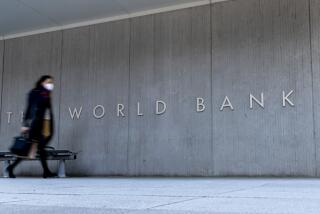Argentina Defaults on Loans
- Share via
BUENOS AIRES -- Argentina defaulted Thursday on its World Bank loans, with officials saying the move was an attempt to break the deadlock in an 11-month effort to reach agreement with the International Monetary Fund over a bailout for this troubled South American country.
Economy Minister Roberto Lavagna announced that the Argentine government would not make an $805-million payment to the World Bank due Thursday. Instead, the government made a token payment of $79 million to cover interest due, not enough to avoid a default as defined by lenders.
In Washington, the World Bank announced that under its rules it could not consider any new loans for Argentina and that further disbursements under existing loans would be cut off in four weeks unless Argentina makes good on its obligations.
Cabinet Chief Alfredo Atanasof said making a full payment to the World Bank would have dropped Argentina’s reserves below the $9 billion that the International Monetary Fund has recommended the country maintain. He said Argentina would make its overdue payments as soon as the IMF agrees to give the country new loans.
“Argentina intends to continue negotiating with the IMF toward a definitive agreement,” Atanasof said.
The IMF is the lender of last resort to developing nations. Its policies and decisions are closely followed by other such agencies, including the World Bank, which focuses on loans to finance long-term development.
Thursday’s action, which came as Lavagna met with IMF officials in Washington, placed Argentina in the small club of international deadbeats that includes Iraq and Somalia.
In January, Argentina defaulted on most of its loans owed to private banks -- about $100 billion in commercial bonds. But it had remained in good standing with the World Bank, the IMF and other multilateral institutions.
Government officials said Thursday’s default was, in part, a warning to the Argentine Congress, which is debating new laws -- including populist measures that would change the tax code and bankruptcy laws -- that could scuttle an IMF deal.
The lending agency has made repeal of similar laws, which it believes harm the local business climate, a condition of any future support to the country. During the 1990s, Argentina’s attempts to implement free-market reforms favored by the IMF were undercut, in large measure, by the country’s inability to balance its budget and by political infighting among its top leaders.
“We don’t want to default,” said a source close to President Eduardo Duhalde. “But the president is trying to send a strong message to the Congress and to Argentina society as a whole that we need consensus if we’re ever going to reach an agreement with the IMF.”
The source said Lavagna and IMF officials had reached agreement on most technical issues. After four years of recession, Argentina’s economy came crashing down last year. Most of the $8 billion in IMF emergency loans to Argentina in 2001 flowed out of the country to overseas depositors in an unsuccessful attempt by the government to shore up the banking system.
In December, the government of then-President Fernando de la Rua froze most bank accounts, prompting a popular uprising that drove him from power.
Congress selected Duhalde as president in January. He devalued the peso and pushed hard for a new agreement with the IMF, suggesting for months that an accord was near.
This week, the Argentine media reported that an agreement was “very close” and that Duhalde hoped an accord would be reached before Thursday’s World Bank deadline.
“It makes them look bad, very weak,” Lawrence Krohn, chief Latin America economist at ING Financial Markets, told the Dow Jones News Service. “It makes them more of a pariah.”
More to Read
Sign up for Essential California
The most important California stories and recommendations in your inbox every morning.
You may occasionally receive promotional content from the Los Angeles Times.










